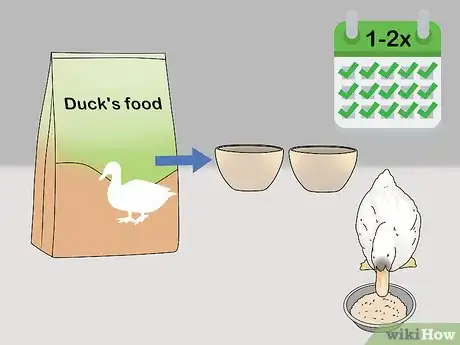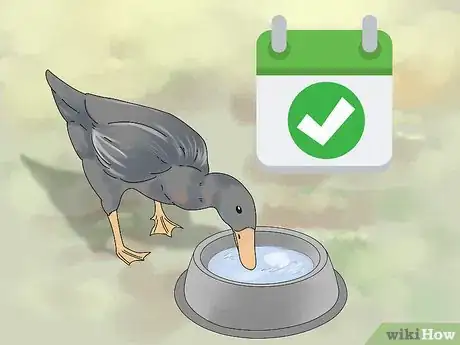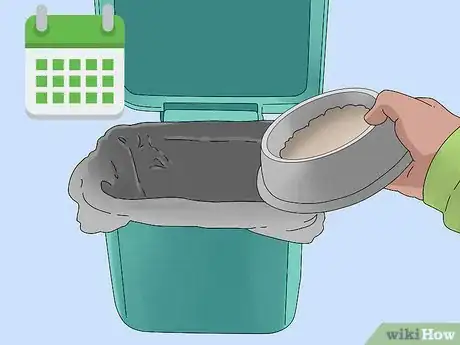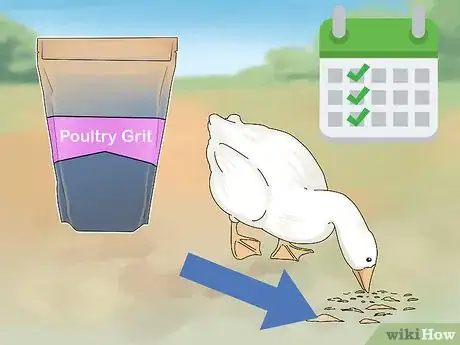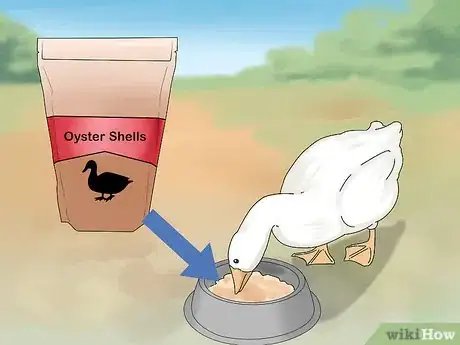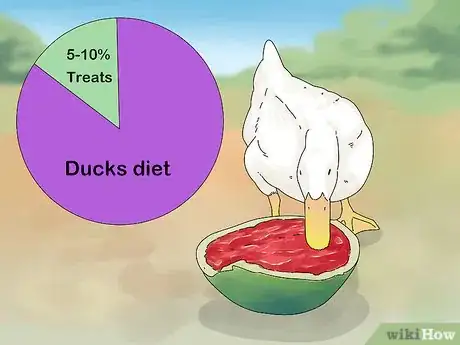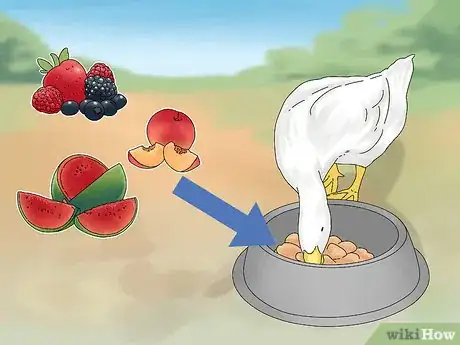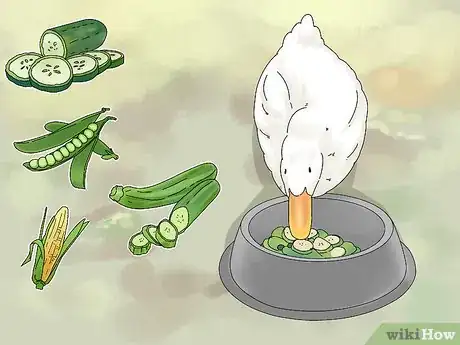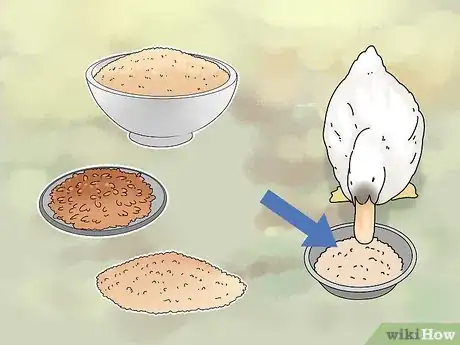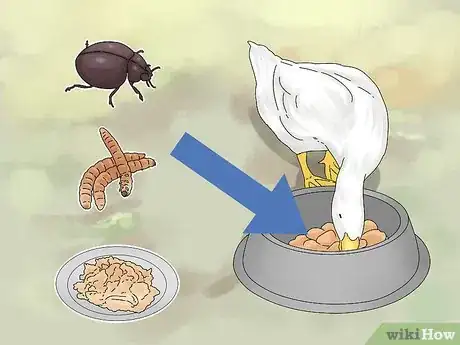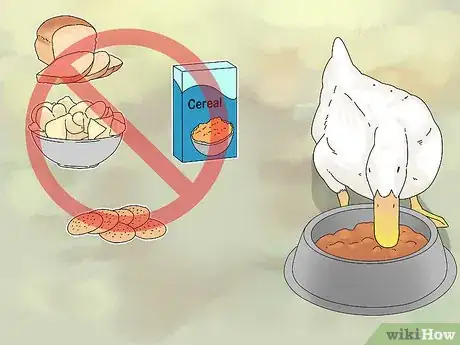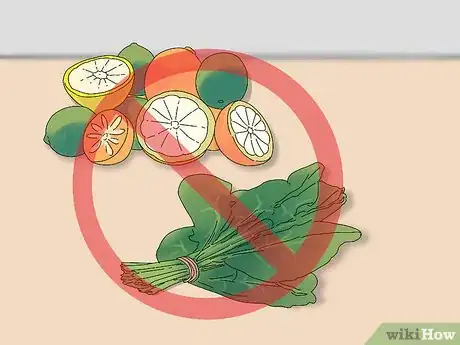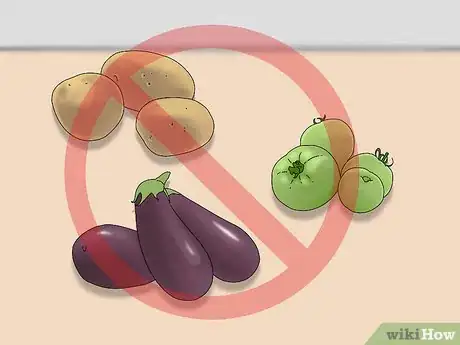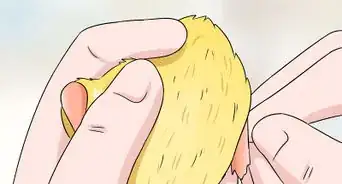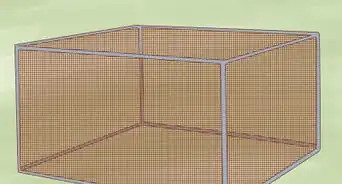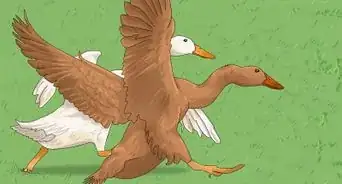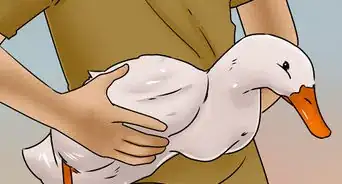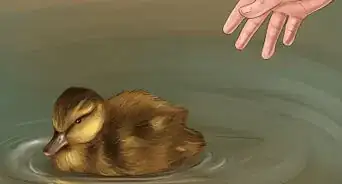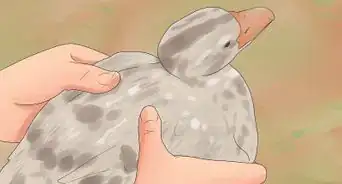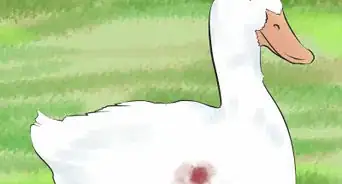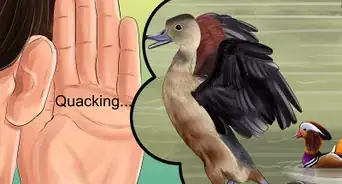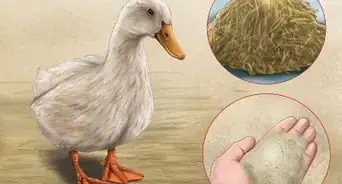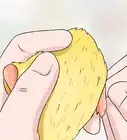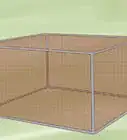This article was co-authored by wikiHow Staff. Our trained team of editors and researchers validate articles for accuracy and comprehensiveness. wikiHow's Content Management Team carefully monitors the work from our editorial staff to ensure that each article is backed by trusted research and meets our high quality standards.
This article has been viewed 26,485 times.
Learn more...
To properly feed ducks, give your them mostly nutritious food meal with adequate protein content 1-2 times a day. You can also give your pet or wild ducks snacks such as fruit, vegetables, and whole grains to supplement their food source throughout the day. Avoid giving ducks harmful food including bread, chips, and nightshade vegetables, as these foods can make them very sick. With proper feeding, you can raise healthy, happy ducks!
Steps
Providing Meals for Pet Ducks
-
1Feed pet ducks 1-2 cups (236.6-473.2 g) of duck food 1-2 times a day. Your duck should primarily eat dry food formulated especially for ducks. Choose from either crumbled or pelleted duck food. This way, they get all of their required vitamins and minerals. Ducks eat more or less food based on their size, gender, and appetite. On average, duck food should comprise about 90% of their daily food intake.[1]
- Buy fresh, high-quality duck food regularly. Always make a note of the expiration date, and do not give your ducks expired food.
- Use duck food formulated with at least 18-20% protein to feed your baby and adult ducks.
- Feed drakes and non-laying ducks a food blend with about 14% protein. A drake is a mature male duck. A non-laying duck refers to a female duck not currently producing eggs.
- Provide breeder food for your egg-laying ducks. This is a special blend of food rich in calcium to help the duck produce healthy and strong eggs.
-
2Provide a large dish of clean water for your ducks every day. Some ducks like to mix their dry food into water before they eat it. Give the ducks some water along with the food so they can do this if they’d like.[2]Advertisement
-
3Dispose of any leftover food each day. In the morning or at the end of the day, dump out any remaining food. It is easy for duck food to get moldy or go bad, especially if they like to mix them with water. If the duck eats moldy or rotten food, it can make them sick.[3]
- If your ducks do not prefer to wet their food, you may be able to go 2 days without throwing it away. This depends on your particular ducks.
-
4Supplement with grit once a week if the ducks don't get it naturally. As ducks graze, they often consume grit from the dirt. Eating grit helps your ducks grind up their food. If your duck roams through a pesticide-free yard, they can eat grit naturally. If your duck lives elsewhere, sprinkle 1-2 cups (236.6-473.2g) across their encounter.[4]
- The ducks naturally eat the grit as they graze through their encounter.
- You can purchase grit at most farm supply stores.
- Give them grit in addition to their daily food intake.
-
5Use oyster shells if your duck’s eggs have thin shells. If your duck's eggs have thin shells, add mix 1 cup (236.6 g) of oyster shells into their daily food. Distribute the food mixture into their food bowls as you feed them throughout the day.[5]
- In a few days or weeks, the shells may seem thicker and stronger.
- Oyster shells are rich in calcium, which helps fortify the duck eggs.
Supplementing Their Diet with Healthy Snacks
-
1Include healthy treats as 5-10% of your duck’s diet. While there is nothing wrong with giving your ducks healthy snacks, you want to keep their diet balanced as a whole. Throughout the day, feel free to give your ducks fruit, veggie scraps, or whole grain for instance. You can give them whatever snack you have available, and you can give them multiple types of snacks a day.[6]
- For instance, if your duck eats 1 cup (236.6 g) of food a day, give it 1–2 tablespoon (14.8–29.6 ml) (15-30 g) of snacks a day.
-
2Offer your ducks fruit for a nutritious, delicious snack. Give them small pieces of berries, melons, peaches, and strawberries, for example. You can cut up 1–2 in (2.5–5.1 cm) cubes of fruit for your ducks, and you can also give them pieces of the rind. On average, give them 1-4 pieces of fruit throughout the day.[7]
- Ducks particularly enjoy fruit with pits, watermelon rind, and seeded fruits.
-
3Give your ducks vegetables like cucumbers, peas, corn, and zucchini. Ducks also like kale, broccoli, and squash. These vegetables make a healthy, worry-free snack for your ducks. Give them scraps straight from the plant, or chop them up into 1–2 in (2.5–5.1 cm) pieces.[8]
- The ducks can eat vegetables as snacks throughout the day in addition to their usual food supply.
-
4Feed your ducks whole grains including brown rice and quinoa. If you want to make your duck’s day, give them filling snacks like oats and whole wheat bread. Cook the rice or grains in advance, and sprinkle about 1–2 tablespoon (15–30 ml) (15-30 g) into your duck’s food.[9]
- If you give your ducks anything but whole grains, they may gain excess weight.
- You can give them small snacks of whole grain daily or as desired.
-
5Include protein-rich snacks like bugs, worms, and eggs. Protein always makes a great snack for ducks. Give them 1-3 mealworms or nightcrawlers a day for a juicy treat. You can also scramble eggs and give the ducks 1–2 tablespoon (14.8–29.6 ml) (15-30 g) as a supplemental snack.[10]
- Bugs and eggs can be used as daily or weekly snacks, based on your availability.
Avoiding Harmful Foods
-
1Do not feed ducks bread or bread products like chips, crackers, cereal. White bread and bread-like products have no nutritional value. These foods often make birds gain weight rapidly and consume empty calories. Even though it may be fun to give wild ducks pieces of bread, avoid doing this for the bird’s health.[11]
- Give the duck food such as oats, corn, or peas instead.
-
2Avoid feeding your ducks citrus fruit or spinach. Spinach and citrus such as oranges, limes, and lemons may make it difficult for ducks to consume calcium, which is crucial when developing their eggs.[12]
- These foods won’t kill your duck, but they can make them sick or make the ducks produce thin eggs.
-
3Never give your ducks white potatoes, green tomatoes, or eggplant. These crops are part of the nightshade family, which are deadly to ducks. Do not give your ducks any part of these plants, including the stem, leaves, or fruit.[13]
- In addition, do not feed your ducks raw, dried beans. The raw form is toxic to ducks. Beans are acceptable as duck food if they are cooked or sprouted.
- Think twice if you want to give your ducks iceberg lettuce. Too much lettuce can give ducks diarrhea, so only give them small amounts.[14]
Warnings
- If you give oyster shells to non-laying ducks, they can develop kidney disease.⧼thumbs_response⧽
- Avoid giving your ducks food formulated for other species like chickens or turkeys, as some of the ingredients may be toxic to ducks.⧼thumbs_response⧽
- If your duck food is moldy or if you find insects inside, throw it away.⧼thumbs_response⧽
References
- ↑ https://www.forthebirdsdvm.com/pages/care-and-feeding-of-pet-ducks
- ↑ https://www.forthebirdsdvm.com/pages/care-and-feeding-of-pet-ducks
- ↑ https://www.forthebirdsdvm.com/pages/care-and-feeding-of-pet-ducks
- ↑ https://morningchores.com/feeding-ducks/
- ↑ https://www.forthebirdsdvm.com/pages/care-and-feeding-of-pet-ducks
- ↑ https://www.forthebirdsdvm.com/pages/care-and-feeding-of-pet-ducks
- ↑ https://morningchores.com/feeding-ducks/
- ↑ https://morningchores.com/feeding-ducks/
- ↑ https://morningchores.com/feeding-ducks/
